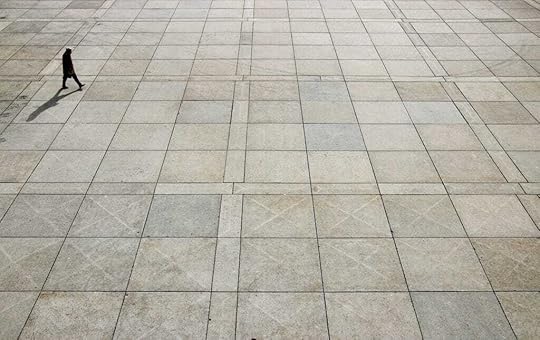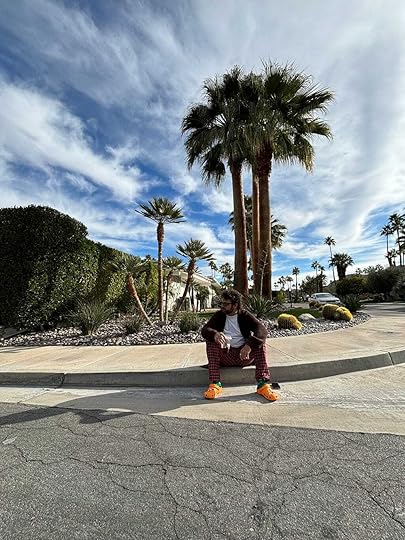Rhys Knight's Blog
December 4, 2024
Your Pain is Not Unique
 Photo by Andrew Gook on Unsplash
Photo by Andrew Gook on UnsplashI find comfort in knowing that my anxiety, stress, fears and regrets are not something I’m suffering alone. Millions of people, including those close to me, are going through the same things.
Fear of losing a job, a house or a loved one. Stressing over not being ‘enough’, not achieving enough yet or being on the ‘wrong’ path. Being afraid of death or sickness or aging. Regretting drinking the stuff, doing the thing, kissing them, not kissing them.
If we could see them, these thoughts would form a massive cloud over the head of society, and that cloud would gain power with silence because that’s how pain works — it feeds on inner turmoil.
I’ve found that as I try to ‘process’ a feeling it gets worse. I’m focusing on the pain and finding ways to justify it: I’m not good enough, I’m too old, I made too many mistakes and I got myself here in the first place.
When I talk about how I’m feeling with someone (anyone), the response is almost always the same.
‘Oh yeah, I feel that way all the time.’
Somehow, that feeling loses some of its sting when it’s normalised. When I talk about it, a valve is released and the pressure goes down. It’s still there, but I can see it properly now. I can handle it. I can sit with it.
I’ll give you an example. I have this intrusive thought that I’m going to get fired. I have a great boss and work for a brilliant company that puts up with my nonsense. I’ve only ever been encouraged and supported and we have loads of fun at work.
But my brain decided that everyone was being nice to me because I’m getting fired after Christmas. That my bosses are being ‘nice’ to me by letting me get through the festivities with my dignity intact before destroying me in the New Year. No performance issues or problems have been raised, but in my head, that makes perfect sense.
So I spoke to some of my colleagues about it. We laughed at me for a while and then one of them said, ‘I always think I’m getting fired. It keeps me awake at night.’ Another one (who you would NEVER suspect) said, ‘I have panic attacks before my weekly meeting because I think I’m getting sacked.’
There’s a solid argument here for an end to capitalism and hierarchy, but that isn’t what we’re talking about right now. The point is that once the feeling is shared and normalised, I’m able — to a certain extent — to laugh it off as a societal issue, not a personal one.
Side note: if the end of a hierarchical society resonates with you, I highly recommend Murray Bookchin . His books on Anarchism and Social Ecology are beautiful and eye-opening.
Once I see my anxiety as ‘normal’, I can deal with it. Even embrace it and be curious about it. Once it’s small enough that I can sit with it and feel it, I find that it loses all of it’s power. To me, it feels like it ‘burns off.’ It's a weird way to describe it, but it’s like a candle that’s at the end of the wick, and it sputters for a while and then…stops.
The more we can normalise all those ‘weird’ feelings the better. The more we talk about fears that feel unique to us, the more we’ll discover that we’re all very similar and it’s not us — it’s the way our society is structured. It’s designed to be competitive and to encourage action through fear.
[image error]December 3, 2024
Life is Pointless. That’s The Point
 Photo by Tim Stief on Unsplash
Photo by Tim Stief on UnsplashAll human beings should aspire to genuine freedom. Freedom from bondage, anxiety, fear and the false structures created by other human beings. The only way to let these things go is to realise they don’t exist and anything you do is inherently pointless.
Stay with me.
Wanting to make a difference and improve things is OK, as long as you realise the impact is insanely micro. Human beings have been around for 300,000 years — a tiny part of universal history — and we’re still very much in our infancy. For context, dinosaurs existed for about 165 million years.
Your works are unlikely to survive you. Maybe your grandchildren will talk about how much they loved you for a while, but that’ll be it. Then you’ll be forgotten, at best you’ll be a name on a family tree that people use as a reference point.
I find huge comfort in that.
You see, if we could have a real impact and if life wasn’t pointless, then we could never be free. If our efforts were going to be judged beyond our death and if our time on earth had an actual impact, we’d have to adhere to the rules of fear, anxiety and bondage.
Here’s an extreme example. What would happen if you stood up right now and left your job? Just walked out the door and never came back. For a few days there would be confusion and concern, “Are they okay? I hope they haven’t done something stupid, let’s call the hospitals…” Then, after a few days or weeks, a story would be created. “They had a mental break. They’re starting their own business. They were always a bit weird.”
You’d be a story for a year, maybe two. Then you’d be forgotten. Whatever you’re doing instead of working also doesn’t matter because literally nothing does. That’s freedom.
What separates humans from actual freedom isn't a job or financial responsibilities or family obligations — it’s a fear of losing those things. Or, the false belief that any of those things are real at all.
Humans are incredibly resourceful. If you were to leave the planet tomorrow — your family, friends and everything — the world would continue. There would be a mourning period, and perhaps you’d be remembered as better than you were, but that would pass.
None of this is depressing — it’s liberating. If nothing we do matters, then we don’t need to worry about getting it wrong or right. If we really lean into this way of thinking, then we don’t need to stress over false societal constructs such as jobs or time or fear or anxiety. Science will tell you that fear and anxiety are a natural response. True — but the’re also learned. This is proven by the fact that some people are afraid of things that other people aren’t. Our minds have adapted to create these things and they can be uncreated by accepting true pointlessness.
To make that a bit less extreme, you can be more free, right now. Let’s start looking at freedom as scale rather than a thing that you have or you don’t. At the bottom of the scale is slavery where there is no freedom. At the top of the scale is a theoretical being entirely free of all desires and fears. In the middle is us. Based on this, you can take steps to be more free by seeing things in your life as pointless. Start with your beliefs and the things that irritate you. It doesn’t need to be extreme and won’t have any external impact, but accepting the pointlessness of your opinions and beliefs lets you stop being triggered when they’re messed with. Less fear, less anxiety, less anger.
Imagine someone arguing that your most cherished beliefs are wrong, and you respond with, “Hmmm…maybe you’re right,” because you’ve realised it simply doesn’t matter.
Now extrapolate that to things you really value. Accept that nothing — including your life — has any point at all. That’s pure and joyous freedom.
[image error]October 28, 2024
We’re Being Sold Misery. I’m Not Buying

I don’t have any political allegiance; I dislike all politicians equally. Their job, along with journalists, is to make us feel sad, fearful or anxious. When we feel this way, we want things to change so the world can ‘get back to the way it was.’ Even though there never was a ‘better time’ or a ‘remember when’ or a slightly filtered sun-drenched age when we were innocent and satisfied with everything and the world was fair and kind. Every generation thinks they remember ‘a time when’ but it never existed. We’re in that time now.
We’re being sold misery. We’re told that society is broken, that evil people are trying to hurt us and that our dreams will forever be out of reach unless we elect/purchase/subscribe.
We’re told we have to care about everything and that there’s a correct way of thinking. Our way. Why can’t everyone else see it? Are they the devil? What’s wrong with these right-wing fascists, left-wing hippies or Christians or Muslims or rich people or immigrants or conspiracy theorists?
We’re given enemies to hate and heroes that will save us because we can’t save ourselves. We’re helpless little kittens in the face of oppression or war or tyrants or diseases or bad people who spend their days trying to destroy us.
And it’s all bullshit. By evil people? No. By a system that was well-intentioned but can no longer keep up.
You see, things haven’t changed, but they have become louder. We used to get our news in the paper and/or once a day on the evening bulletin. Then, we’d have to wait until tomorrow for the next bit. We used to hear from politicians during the election cycle. Pop stars used to sing and movie stars used to act and we didn’t know what they thought of the environment or which political party they were a member of.
Now everything is amplified. The world is now a busy cafe where everyone has to speak louder in order to be heard by the person sitting at the same table. If you want everyone in the cafe to listen, you’ve got to be loud and unique and compelling and that’s what everyone tries to be.
This type of communication doesn’t allow for nuances or subtle discussion points; it relies on headlines, statements, and immediate solutions.
It’s why there are so many experts selling solutions to complex issues with no-brainer solutions on social media. You’re not rich? What a loser; I can fix that for you, and everything will be fine. You’re not pretty? Try this makeup or sip this drink that someone pretty is drinking. Problem solved.
It was never the intention for the volume to be turned up so loud and I don’t believe anyone wanted the narrative to be so negative. It was borne of necessity. You can’t stand out by being satisfied or happy with the world.
So what do we do? I’m not one of those solution-bringers and I don’t have anything to sell. But I’m going to focus on the things in MY world that are amazing. My family. My city. My garden. My local coffee nook and bookstore and market. The things that are right in front of my face that I have too often overlooked in the past. Sometimes I’ll be sad or angry or frustrated and that’s okay too — I get to be a human for a very short period of time so I’ll embrace the whole thing.
That’s the end. There’s no sales pitch. The world is awesome.
[image error]August 4, 2024
Don’t Say ‘No’ to Hate. Start Hating Better

Racism, for me as a white dude who has never experienced it, has always seemed pretty dumb.
I mean, I get it. It’s much easier to generalise people based on certain characteristics rather than having critical and meaningful opinions of them. It must be comforting for a white supremacist to say ‘all black people are less than me,’ while getting beaten by someone who is their obvious physical superior.
Likewise, ‘all Asians are bad drivers’ requires less brain power than dealing with one particular bad driver who happens to be Asian. That would involve treating every person like an individual, each with positive and negative traits that require nuanced thinking to analyse.
I find racism weird because it only works in a colour vacuum. In order for me to maintain a hatred of a particular shade of human, I need to avoid interacting with them; otherwise, as mentioned above, I’ll find one I like.
I’ve never tried being a Nazi, but it must be hard work to avoid other races in today’s multicultural society. How inconvenient would it be if you popped into a cafe only to be served by a friendly, happy and helpful brown person? I just wanted an espresso, not to have my oversimplified worldview challenged.
The racist people I’ve met seem to have one thing in common — they’ve got a detailed hypothesis. I remember a simpler time when someone could hate another person because of the colour of their skin. Now, I have to sit through a ten-minute thought exercise on DNA and genetic predispositions and a scientific study that was done in the 60’s even though nobody can find it online.
We are told to reject hate, to say no to bigotry and to fight division. But I don’t wanna. I think these things are bad, but I also feel like being racist is the modern equivalent of being afraid of witches — the fact that we haven’t moved on yet is ridiculous.
There are so many better things to hate people for: having a phone conversation on the train using the loudspeaker, walking in the middle of a busy footpath, or wearing white sunglasses. If you do these things, I will hate you, not because of the colour of your skin which is a broad generalisation but because of what you are doing. It’s a personal hate, which is much better.
Let us not say ‘no’ to hate — let us not care about skin colour, religion or whatever and instead focus on a higher level of hatred: one directed at individuals.
[image error]April 15, 2024
Getting off Prozac
Are you thinking of getting off an SSRI? I wrote this for you because I struggled to find any good resources online from people who had actually done it. Also, this is not medical advice so please speak with your doctor or psychiatrist.
I was on Prozac for more than a decade, and getting off it was much harder than I thought it would be.
I’m not ungrateful for Prozac; it undoubtedly saved my life, but man, the side effects are something else.
So why did I decide to get off Prozac?
Like many other anti-depressant users, I’ve tried to stop before, but without a plan. It’s no secret that when you stop taking SSRIs abruptly, it’s nightmare juice for the brain. I’ve ended up in some pretty dark places by deciding for some stupid reason that stopping quickly (again) was a good idea.
This time, it was different, and by ‘it’, I mean ‘I’ was different. You see, I’m not just ‘out of the darkness.’ I’m calm. I like myself. I have an identity. Those were the things that I always had this internal back-and-forth about, and for the first time since I was a small child, that conversation wasn’t there anymore.
Importantly, this was after a lot of work. Meditation, yoga, exercise, introspection, counselling, stopping bad habits, finding a spiritual output, studying thought processes…I’m only putting an ellipsis there because this article could be my list and that would be boring.
So, I was ready to stop, but I needed a plan. My thinking was to go really slowly. I’d recently moved from three tablets (60mg) a day to two (40mg), so I needed to get to one(20mg) and then hang out there for a while.
I made a simple calendar out of a series of PostIts and stuck it inside my bathroom cabinet. Here it is (please don’t be intimidated by my fancy design) —
 I haven’t taken it down yet
I haven’t taken it down yetMoving from two tablets to one was pretty effortless. I didn’t get any brain zaps, and my mood was stable. I paid close attention to my moods and thoughts as part of this process. I told my wife about my plan and warned her there may be more mediation and ‘introspection’ (a nice way of saying I’ll be really quiet and borderline rude) than usual. She was encouraging, which helped a lot. I could not have done this without her being awesome.
Speaking of which, I do mindfulness meditation and ‘aware of awareness’ meditation. The latter put me in the mindset I mentioned earlier and changed my life—or got it back.
In week five, I moved from one tablet a day to one tablet every second day.
The start of week six was the killer. I guess that’s due to the lag of getting fluoxetine into and out of your system. I was experiencing brain zaps and anxiety from the reductions from a few weeks earlier.
Not gonna lie — it sucked.
In saying that, it was nowhere near as bad as when I first went on Prozac (originally I was on Lovan) or when I’d tried to get off the meds quickly. But, the brain zaps were prevalent. Dozens each day.
On that, I experience brain zaps as annoying thuds in my head. I know people who are crippled by them and describe them as ‘painful.’ If that was me, I probably wouldn’t have been able to soldier through.
I’m also aware that nobody knows what causes brain zaps, which I find a bit scary. I chose to think of them as a positive — my brain starting up again or something like that. My brain sparking? I dunno, it made me feel better.
As you will see from my clumsy little planner, I stopped using Prozac entirely when I was supposed to move to two pills per week. I felt like my brain zaps were worse on my off days and I just wanted it out of my system. This is just me going against medical advice, and I don’t recommend it. But it worked for me.
I’m now at week 13, and I’m still experiencing some brain zaps, but no ongoing anxiety. My meditation is helping a lot. I see a marked decrease in brain zaps after meditation, and I’ve got a 3-minute routine that I can use if things are getting grim.
As for the results, my thinking is much clearer. I am calm, and I find myself able to focus more. Again, I’m still getting zaps, but they seem to be reducing over time; we’ll see.
Would I do it again? Yes, but only if I was in the right headspace. SSRIs are a clumsy medication that we don’t fully understand, but they helped me and kept me here, and I’m grateful for that, but I’m also happy they’re not part of my life anymore.
[image error]April 10, 2024
Optimism is the Most Powerful Rebellion

Politics, ideology and religion have been weaponised.
I’m not allowed to be left-wing without adhering to a confusing list of seemingly random criteria.
I can’t be right-wing without wanting to arm everyone with military-grade weapons and be accused of being racist.
I can’t listen to certain music without being tainted by the artist's beliefs.
Or watch certain films without being accused of being ‘woke’ or whatever the opposite of that is.
So, I’ll be optimistic. Also philosophical.
Philosophical means that I know I’m unimportant and nobody cares what I think. I love that.
I get 80-ish years. The universe has been around for 13 billion years, and Earth for 4.5 billion.
I’m so insignificant it’s laughable. That’s awesome. It’s like a superpower — I can try anything, be anyone, and there are no ‘real’ implications.
Except death, but that’s probs happening anyway.
I can care about what I want, and perhaps more importantly, I can not care about what I want.
Presidential election? I couldn’t care less.
Is that singer a dick? I still like the song.
Does the actor’s rant taint the movie? I won’t watch the rant, but I’ll enjoy the movie.
Pride in, defence of, and creating an identity around the race, country, religion or anything else outside of myself as an individual is destructive. Possibly externally but definitely internally. Trust me. I’ve tried all of them (don’t ask).
When it feels like everyone is on the attack, angry about things not being the way they should be (whatever that is) and are seemingly searching for the thing that will help everything make sense and form the basis of their identity from now on, I’m just going to be optimistic.
It doesn’t come naturally to me, but optimism is much more logical than any other way of thinking. It makes me feel happy, and it seems to make other people happy, too.
Optimism is looking for the positive but not forcing it, grasping at it, or making any effort at all. Just allowing the good to be there, if it is.
It’s listening to someone you don’t like and seeing their point.
It’s enjoying the rainy, cold day.
It’s having a debate with someone without getting personal or aggressive.
It’s trying new things. Smelling new things. Climbing new things.
It’s smiling for no reason when you’re by yourself, maybe because you’re by yourself.
It’s thinking, ‘Does this impact me?’ before getting enraged.
It’s realising you won’t be here in 80 years, so what’s the point in doing anything else?
For me, it’s gardening. Running. Reading. Hanging with my loved ones. Writing. Riding my motorbike. Travelling. These are the threads that mean ‘joy’ for me.
Do whatever makes you happy and believe in whatever makes you happy—as long as it doesn’t hurt other people. Physically, I mean, because trying to avoid angering those seeking anger is a fool's errand.
I rebel against the woke and their opposite, the ‘I say what I want crowd’ because they’re both miserable.
I choose to rebel.
[image error]April 3, 2024
Messy Thinking, Chaos Living
 Exhibit A : A chaotic, messy human. Circa 2024
Exhibit A : A chaotic, messy human. Circa 2024I spend a lot of time with Artificial Intelligence and it messes with my head.
What happens for humans when ‘full’ AI begins? Artifical General Intelligence (AGI) will — in theory — mean that any job with a logical sequence or programmable outcome will be instantly redundant, in that AI will be able to do it faster and better.
As a writer, that’s not great.
Our boy Elon has proposed a universal basic income. Not a new idea, but Elon is saying that we’re all screwed and will need to be paid by the state in because none of us will have jobs.
Don’t get me wrong, I’m here for that. See you at Starbucks.
But is this true? Sure, AI can already create a new Rembrant and compose an original symphony, but can it replace our ‘human-ness’ and what is that exactly?
I read a lot of weird stuff. I love occultist works (The Kybalion is my bible…along with the actual Bible) and self-help books. Michael Singer’s seminal work ‘The Untethered Soul’ and his follow-up ‘Living Untethered’ (which I consider to be the stronger book) talk about surrendering to the flow of life. Singer speaks of the arrogance of humans in thinking they can change what has existed for billions of years and how it’s far more intelligent to live in flow with the river of life, rather than trying to fight it.
The river of life doesn’t follow a logical or programmable outcome and so, for the average human, appears to be chaotic and messy and random. But, according to Singer, once you stop trying to fight it and just lean back and float, you become part of the it and what used to appear as chaos becomes unthinkably beautiful.
There’s no way to ‘explain’ that and therefore there’s no way to program it, or set up variables to allow for it. Allowing for chaos is an oxymoron. AI can’t do it.
For the few million years humans have been on earth, we’ve fought for control. We’ve seen our key strength as our ability to build a dam, or create a new housing development or predict the weather. We’re the dominant species on this planet and we’ve proven it.
But maybe it’s time for a change. Perhaps, as we create a tool that is going to challenge our identity of who we are, it’s time to lean back and embrace chaos as no machine will ever be able to.
Maybe we should stop rewarding structure and treat life as more of a jazz band jamming in an empty bar at 10am and not caring what they sound like as long as they’re in the moment. For example, let’s embrace the inherent messiness of our own brains. The randomness of thought. The nonsensical pathways we forge internally to get to an outcome that might just be insane enough to work.
The time we’re entering has the potential to be a new Italian Renaissance. The Renaissance followed the late middle ages and maybe our ‘middle ages’ is the late industrial stage we’re now in. The darkness of this period of greed and ambition could be followed by a time of art, discovery and openness to different things that could make Raphael, Michelangelo and Monteverde seethe with jealousy.
As we stop rewarding ourselves for working. As capitalism evolves and the means of production are centralised under AI and most likely states (whatever they end up looking like) scramble for control, it’ll be time for humans to become their authentic selves. Flawed. Curious. Chaotic. Embracing of just how temporary organic life is and realising how these attributes, seen as things to fix for thousands of years, are what make us human.
Imagine what we will create with this new way of thinking. Freed of the need to work and make money, what will our lives will look like. How will real freedom feel once the shackles of ‘growth’ and ‘improvement’ are removed?
The great artists of Europe never strove for control or power over their fellow man. They were endlessly curious and challenged their own thinking and tried new things. Not for the credit, but because, deep down, that is what sparks joy in us as a species; thinking, creatin and facing life with optimism and fearlessness. Because the worst case scenario is that we die — and that’s going to happen anyway.
Let’s think messy, be chaotic and remember who we are. God’s weird, freaky, flawed and most extraordinary creation that, when being ourselves, no AI can duplicate.
[image error]November 27, 2023
The Self-Doubt Spiral
 Me. Self-doubt. You get it.
Me. Self-doubt. You get it.Rightly or wrongly, I’ve been very open with my mental health, or lack thereof. When I was first diagnosed with depression, I wrote blogs and got a few published in places that used to matter. I even got a radio interview that ended up being pretty weird.
Then I wrote a book showing the funny side of mental health and got a write-up in Maxim for some reason. The book sold so well that I made dozens of dollars and can now afford branded toothpaste. Small size, but still branded.
Mental health sucks. When you think you’ve got all the inputs handled (drugs, therapists, quitting drinking), the outputs (anxiety, panic attacks) sneak up on you.
I’ve smashed the inputs. I do yoga, meditate, see a therapist and burn crap that makes my house smell weird. I’ve quit alcohol (12 months in February), I’ve got a great job which I work hard at and my wife and daughter are amazing.
So imagine my surprise on Saturday afternoon when sipping coffee (which I’m not quitting, you masochist), I found myself on the edge of a self-doubt spiral.
If you’ve had one, you know how it feels. It starts with a suggestion that sneaks in almost subconsciously. It could be ‘you’re getting fired,’ or ‘your partner is leaving you,’ or ‘you’re not good at tennis.’
For me, it was ‘you’re never going to be anything, and you’ve achieved nothing in your 44 years.’
To understand the spiral, you need to recognise it for what it is. Not a statement but a question.
‘Are you never going to be anything, and why have you not achieved anything, you old bastard?’
To which the brain responds with evidence, either pro or con. My brain, being a dick, gave a load of reasons why I’m a massive piece of underachieving shit, and I sat in bed covered in heavy warm things watching Netflix and burning candles for the remainder of the afternoon.
What’s the cure? This isn’t a self-help article. I have no idea. I lie in a puddle of dread until it goes away. I’ve tried everything.
The good news is it’s only temporary, for me anyway. Now I’m writing about it, and I feel fine. But I know the spiral is sneaking around, waiting for me to be off guard.
I’ll just keep trying everything until then.
[image error]January 10, 2023
This Year I’ll Be More Consistent. Just Like Last Year.
It’s that time of year again and I’m bursting with good intentions. I mean, I was on the 3rd of January but now it’s the 11th and I’m less…
November 7, 2018
Linking Your Product With Your Customer’s Identity
 Photo by Mikail Duran on Unsplash
Photo by Mikail Duran on UnsplashIdentity marketing is the strategy of defining your target audience, not by their habits, job or other generalist demographics, but by how they see themselves — their core identity.
As humans, we all seek to define ourselves and in doing so create conscious and subconscious requirements to make that definition clearer to ourselves and the rest of the world. The woman in the tailored suit with her hair tied back in an aggressive ponytail, carrying an expensive briefcase may define herself as a “no-nonsense businesswoman.” But it’s not enough to forge an identity through clothing and mannerisms, an identity must be constantly deepened and enhanced for it to survive and flourish. For our businesswoman, a subscription to the Harvard Business Review, a black Audi, and a name brand watch may be on her wish list. Perhaps a golf membership to further networking opportunities, a partner who understands her motivations, or a home that is minimalistic and efficient.
Obviously, this example is an oversimplification. People are multilayered and have commitments, needs and wants beyond a singular identity, but at the core of this is the sense of self that is associated with the reptilian brain. This identity is what makes people leap out of bed in the morning, it’s why people spend more than they can afford on products that make no sense. This identity is the one that sets our soul on fire, makes us start new businesses, write books, and have the courage to introduce ourselves to our heroes.
When we are authentically connected to this identity, we are unstoppable.
But this isn’t a pep talk, it’s a blog about marketing. So how do you associate your service or product with the identity of your target customer?
You make your product or service an idea.
Ideas remove any requirement for the perfect product or service. They change the transaction from being one of barter — here, take this and I’ll take that — to one of membership — join us, you’re the right person.
The list of businesses and organisations that understand and embrace identity marketing is virtually limitless and includes a who’s who of politics, sports teams and businesses. The Nazi Party changed politics when they transformed a political movement into something people could be a part of through symbology — the swastika — and a sense of moral superiority, fuelled by a hatred of others. Nazism became an identity for millions of people.
Nike went from selling shoes to communicating an ideology. The Swoosh is more than a logo, it’s a source of pride and status for sports people, streetwear enthusiasts and fans around the world.
Manchester United during the early 2000’s became more of a religion than a sports team based in the UK.
All of these organisations de-prioritised their owners, staff members and internal teams, and made the identity of their customers the focal point of all their efforts. When you pull on a pair of Nike shoes, you feel a part of something bigger, and your identity expands. When Germans pinned the swastika to their lapel in the 1930s, they no doubt felt the same way.
Identity marketing means looking at your customers from an emotional standpoint and addressing needs that they will always have — because those needs are who they are. By turning your product into an idea, and communicating that idea in a way that encourages people to join, a purchase becomes an automatic response to the right people.





